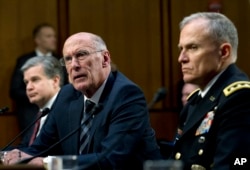U.S. President Donald Trump took to Twitter Wednesday, appearing to reignite his long-standing feud with the country’s intelligence agencies by belittling their assessments on Islamic State, North Korea and Iran.
In a series of posts, Trump claimed responsibility for key improvements while calling out his intelligence chiefs for being “extremely passive and naïve.”
“When I became President, ISIS was out of control in Syria & running rampant. Since then tremendous progress made, especially over last 5 weeks,” he wrote, using an acronym for the terror group. “Caliphate will soon be destroyed, unthinkable two years ago.”
“North Korea relationship is best it has ever been,” he wrote of his efforts to engage with Pyongyang. “Decent chance of Denuclearization...”
And on Iran, he wrote intelligence officials, “are wrong!”
“Perhaps Intelligence should go back to school!” the president added.
A differing threat assessment
Trump’s tweet-storm came just one day after his director of national intelligence, along with the directors of five other key intelligence agencies, including the CIA, FBI and NSA, delivered their annual Worldwide Threat Assessment to U.S. lawmakers.
In contrast to Trump’s tweets, and other previous public statements, the picture painted by the intelligence chiefs was grim, warning the United States was facing a “toxic mix” of threats and is in danger of seeing its global influence wane as key adversaries, like Russia and China, position themselves to fill the resulting void.
Their public, unclassified assessments on Islamic State, North Korea and Iran also stood in stark contrast to the president’s past assertions, for example from December, when Trump said, “We have won against ISIS. … We have beaten them and we have beaten them badly.”
“ISIS is intent on resurging and still commands thousands of fighters in Iraq and Syria,” Director of National Intelligence Dan Coats told lawmakers Tuesday, while acknowledging the terror group’s self-declared caliphate had been reduced to a few small villages in Syria, which would likely be liberated in a matter of weeks.
“ISIS will continue to be a threat to the United States,” he warned. “This terrorism threat is going to continue for some time.”
On North Korea, Coats and CIA Director Gina Haspel reiterated long-standing concerns that North Korean leader Kim Jong Un, despite being willing to talk with the United States, is not truly ready to give up its nuclear ambitions.
“Its leaders ultimately view nuclear weapons as critical to regime survival,” Coats said of Pyongyang.
“The regime is committed to developing a long-range nuclear-armed missile that would pose a direct threat to the United States,” Haspel added.
As for Iran, the differences between the intelligence agencies and the president appeared to be less glaring.
The intelligence officials told lawmakers that the 2015 nuclear deal between world powers and Tehran is working, at least for now, even though Trump withdrew from the deal while re-imposing sanctions.
But they agreed with Trump regarding the larger threat.
“Iran maintains the largest inventory of ballistic missiles in the Middle East,” Coats told lawmakers. “Tehran continues to sponsor terrorism.”
“These actions underscore our concerns for a long-term trajectory of Iranian influence in the region and the risk of conflict escalation,” he added, noting Iranian-backed militants would continue to threaten U.S. forces in Iraq and elsewhere.
Reaction to Trump's tweets
The CIA, Defense Intelligence Agency and the National Security Agency declined comment when asked about the president’s tweets Wednesday.
But the public critiques drew a quick response from some U.S. lawmakers and former intelligence officials.
“The President has a dangerous habit of undermining the intelligence community to fit his alternate reality,” Senate Intelligence Committee Vice Chairman Mark Warner, a Democrat, tweeted in response. “People risk their lives for the intelligence he just tosses aside on Twitter.”
Senate Democratic Leader Chuck Schumer released a letter he wrote to Coats saying he “cannot allow the President’s ill-advised and unwarranted comments” to stand, and that Coats, Haspel and FBI Director Christopher Wray should insist on meeting with Trump to “educate him about the facts and raw intelligence” behind the threat assessment.
Former CIA Director John Brennan, an outspoken critic whose security clearance was revoked last August also took Trump to task, calling the president’s tweets an indication of “the extent of your intellectual bankruptcy,” writing that Americans “need to understand the danger you pose to our national security.”
And former Director of National Intelligence James Clapper told VOA the president’s tweets were “sophomoric.”
“He should actually read the written assessment,” said Clapper. “I guess he’s reacting to the media focus on the disparities between what the IC (Intelligence Community) assessed and what his ‘gut’ tells him, so, of course he had to push back.”
'Not that big' a deal
Yet other former officials described the commotion over the president's tweets as overblown.
"This is not that big a thing," said Steve Bucci, a visiting fellow at the Heritage Foundation who previously served as an assistant to former U.S. Defense Secretary Donald Rumsfeld.
"Frankly, I see both sides kind of doing what they get paid to do," he told VOA. "The intel community is supposed to be the factual analyzers and the president picks the policies he wants to follow.
"They clearly have failed to convince him that their position is correct. And now everybody is going nuts because he's not treating what the intelligence community says as holy writ," Bucci said.
Bucci also said it would be a mistake to view Trump's tweets as an indictment of his intel chiefs as opposed to messages meant for Iran and North Korea.
"He's trying to move both countries in directions that are beneficial to U.S. interests," he said. "He's not shutting down the intel community."
Not personal
For many former intelligence officials, that Trump took aim at U.S. intelligence agencies on Twitter, was no surprise.
“President Trump’s antipathy toward the intelligence community is well known and stems chiefly from the community’s willingness to be publicly candid, near the beginning of Trump’s presidency, about Russian interference in the 2016 election,” Paul Pillar, a veteran CIA officer now with the Center for Security Studies at Georgetown University, told VOA in an email.
“Trump’s critical tweets about the new worldwide threat statement, however, probably have less to do with general antipathy than with how the statement includes inconvenient truths that clash with incorrect assertions by the administration.”
Larry Pfeiffer, a 32-year veteran of the U.S. intelligence community with stints as senior director of the White House Situation Room and chief of staff to former CIA Director Michael Hayden, said such tension, in and of itself, is not unusual.
“I can’t think of a president of the United States or a policymaker who didn’t like what the intelligence community had to say,” Pfeiffer said, adding intelligence officials have long seen it as their job to tell truth to power.
But Pfeiffer cautioned that even if Trump’s responses are merely about politics, it could still take a toll.
“It can publicly affect morale … when the ultimate customer has this kind of attitude,” he said. “He’s publicly criticized the intelligence community more than he’s criticized [Russian President Vladimir] Putin.”
“The question for me is, at what point do these intelligence chiefs quit,” said John Sipher, a 28-year veteran of the CIA who once ran the agency’s Russia operations.
“It is one thing for the president to have differing views,” he said. “It is another thing altogether to openly attack or belittle the IC.”












